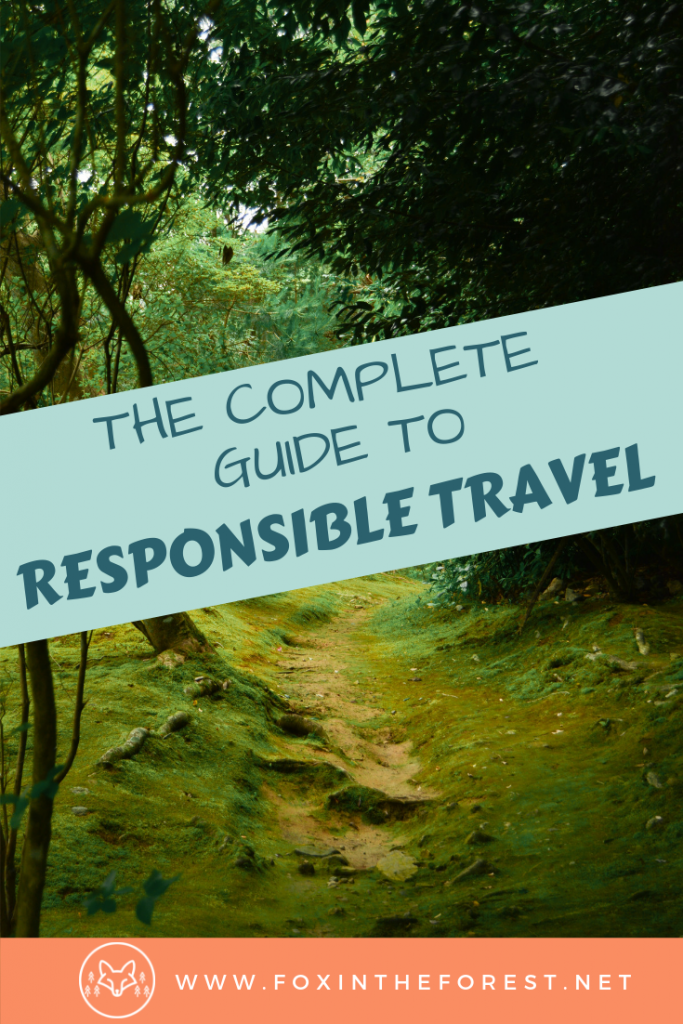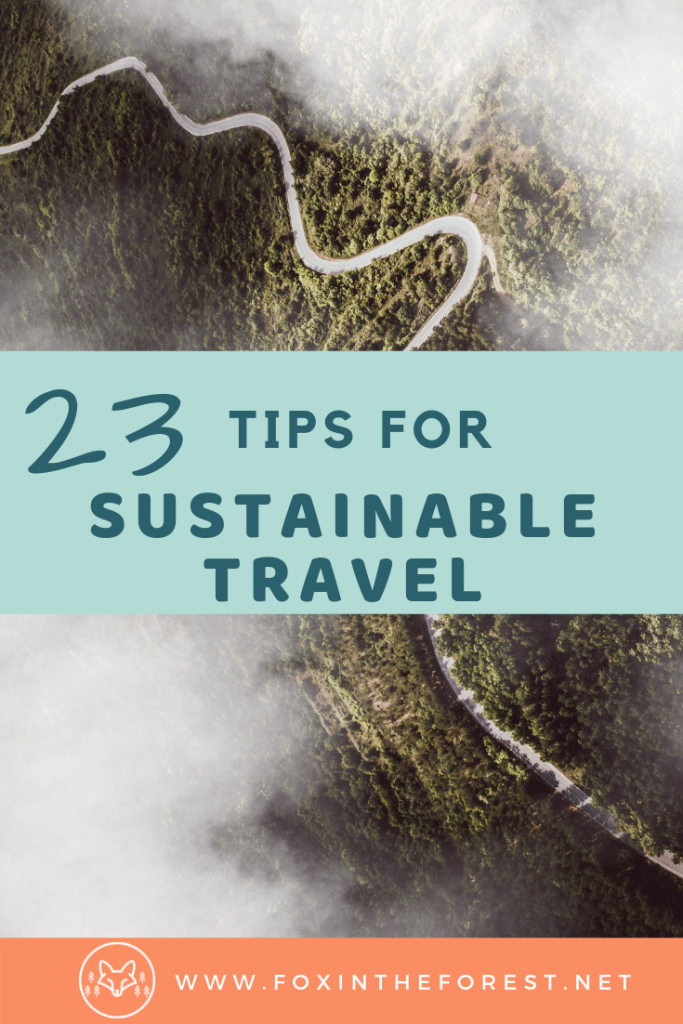Last Updated on August 26, 2019 by foxintheforest
With more and more people leaving their home cities and traveling each year, the world has seen a huge change in the impact of the places we love. I’ve had the privilege of traveling the world for 18 years. I’ve been all over the globe and seen beaches become littered with plastic waste, hiking trails become over-loved, and cities bursting with tourists. So what is responsible tourism? And how can we do better?
These sustainable travel tips are not only geared towards making you a more eco-friendly traveler but also how to properly interact with local communities and ensure that your travels leave a positive impact on a community.
What is Responsible Tourism?
With so many different words to describe how to travel in a more impactful way, the jargon can often get clouded and confusing. At the heart of responsible tourism and responsible travel is to approach travel with your impact in mind.
You want to be aware not only of your environmental impact, but your social, and economic impact as well. Are you engaging with the local community in a meaningful way? Do you book tours through local companies? Are you encouraging cultural exchanges by learning some local language? Do you take public transportation? All of these things have an impact on the local community.
In short, responsible tourism aims to do several major things:
- Reduce your environmental impact on a place. This means choosing to avoid plastic products, take more eco-friendly modes of transportation, support eco-friendly lodging, and practice Leave No Trace.
- Support local businesses and ways of life
- Only engage in ethical animal encounters if you choose to be involved at all.
Definitions of Different Types of Sustainable Travel
Before we take a deep dive into the world of responsible tourism and sustainable travel, let’s take a minute to define what different types of responsible tourism are out there and which sides of this enormous Rubix cube they refer to.
- Responsible travel: The complete thought of taking into account your economic, environmental, and social impact of the places you travel to. Also the same as responsible tourism.
- Sustainable travel: Refers specifically to your environmental impact. Also the same as sustainable tourism.
- Ethical travel: Similar to responsible travel where you consider your total impact. Mostly used to describe animal encounters or interactions with cultural groups such as visits to indigenous peoples. The same as ethical tourism.
- Ecotravel: Similar to sustainable travel, but a little more defined. Ecotravel involves sustainable travel to natural places, such as national parks, world-famous trekking routes, diving destinations, and wildlife safaris. Also called ecotourism.
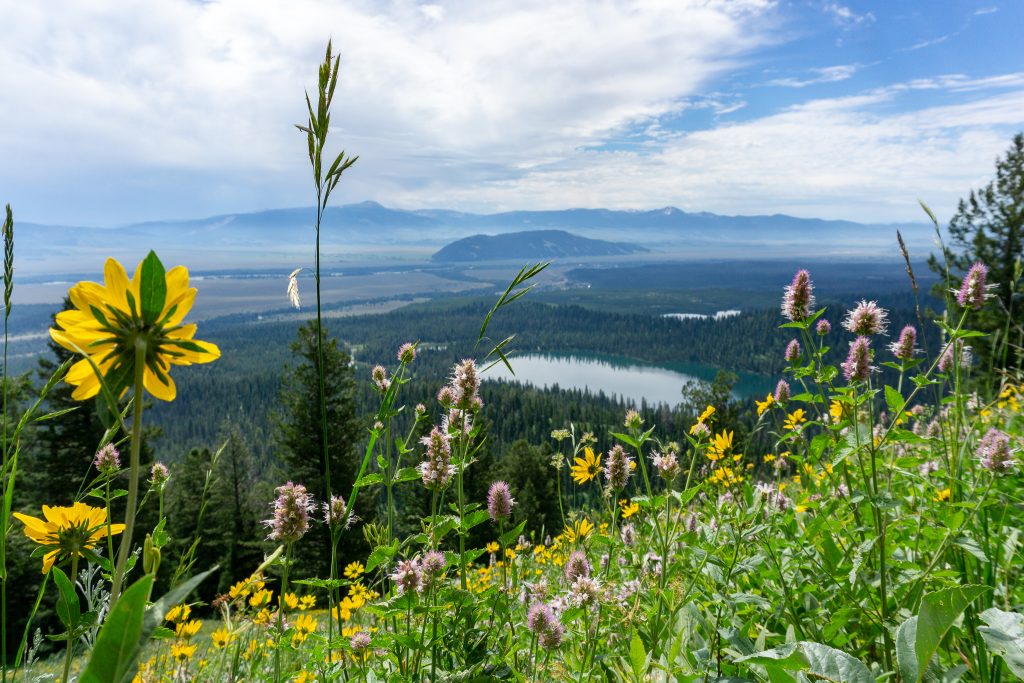
Myths about Responsible Travel
Many people don’t engage in ethical travel because they believe there is too much work or too much of a barrier to entry. That’s simply a lazy mindset. Here are a few myths about sustainable travel and how you can begin to debunk them.
Responsible Travel Myth 1: Ecotravel and Sustainable Tourism are Only for Rich People
Yes, it’s true, that in the grand scheme of world-wealth, if you’re traveling internationally, even as a backpacker, you are considered rich. I’m not trying to deny privilege, but I do believe that even budget travelers can participate in responsible travel.
I’ve been traveling ethically for about 10 years now. In that time I’ve gone on shoestring adventures to the other side of the globe. I didn’t have a lot of money, and every dime I could find between my couch went towards saving for travel. However, I haven’t used a plastic bottle of water while traveling for almost a decade now and I’ve certainly figured out how to support local businesses anytime I’m away from home.
Most of the time a budget-conscious traveler is more engaged in sustainable tourism than someone on a luxury adventure. Why? Buying your own water filter is cheaper than constantly buying plastic bottles. Local tour companies don’t inflate their prices the way that western-based companies do.
Responsible Travel Myth 2: I Can’t Have a Luxurious Ethical Travel Experience
On the flip side of that coin, many luxury travelers don’t believe they can partake in responsible travel because it’s dirty, janky, or undesirable. That’s simply false.
Luxury travelers certainly have their work cut out for them though. Chances are if you engage in luxury experiences you’re taking private cars, guzzling bottles of plastic water, and being handed fancy drinks with plastic straws. Maybe you’re even staying in (gasp) a major hotel and resort chain conglomerate.
The luxury travel industry has quite a bit of waste and participates in many unethical treatments of their employees. Do your homework. Research where you’re staying and try to support small business luxury experiences that give back to their communities and have the environment in mind.
Responsible Travel Myth 3: Sustainable Travel is Only for Eco Travelers
The thought that you can’t be a responsible traveler if you only engage in urban trips is simply wrong. In fact, many urbanites utilize public transportation, support small eateries and boutique hotels.
You don’t need to stay in a bamboo shack in the woods, pooping in a hole in the ground to be considered an ethical traveler. Although that sounds delightful to me, those who enjoy traveling through more urban environments can be ethical travelers too. All you need to do is be aware of what you are doing and where you are spending your dollar.
Responsible Travel Myth 4: Everyone Who Advertises as Being Ethical Actually Is
Listen, I work in marketing, it’s my job to sell people things. Marketing is a great big world that is designed to tell you whatever you need to hear in order to pass your cash over. Period.
Sometimes people bend the truth, especially when it comes to ethical treatment of people and animals, as well as sustainability. This is because it’s a trendy topic and everyone wants to capitalize.
Again, I urge you to do your research, read reviews, talk to people who are experts in the field. Be aware of anything where the reviews counter-act what a company’s message is. This is especially true with guided tours that include interactions with indigenous groups and animals.
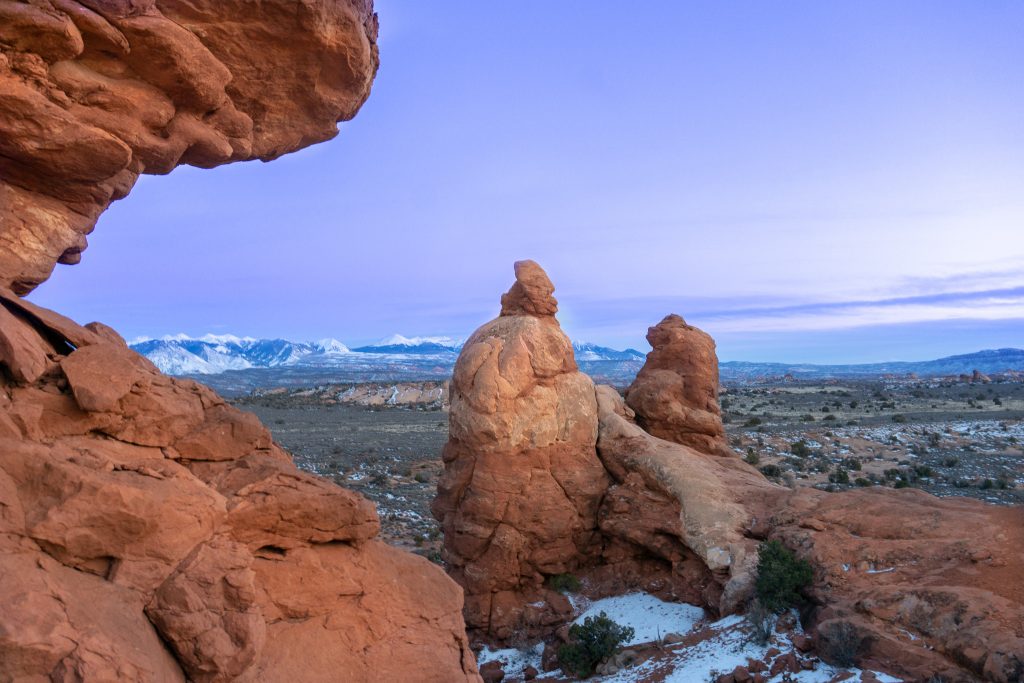
Ethical, Responsible, and Sustainable Travel Tips: Planning Your Trip
The key to both responsible tourism and sustainable travel is to start thinking about your impact before you even buy your initial plane ticket. The number one sustainable travel tip is to be prepared to do your homework.
Ethical travel doesn’t simply happen, it is a choice. So choose to take the time to really think about where you are going and what you are doing on your adventure. Here are a few sustainable travel tips to think about as you plan.
Avoid Visiting Areas Prone to Overtourism
Everyone wants to see the same glamorous Instagram shot that bombards their social media feeds each and every day. I get it. It can be really tempting to visit a place like Iceland, Trolltunga in Norway, or Horsehoe Bend in the Grand Canyon.
I’m going to let you in on a little secret: there are plenty of exceptional places to visit that aren’t plagued with the ill effects of over-tourism, oftentimes right nearby these overly-touristy landmarks.
The problem with visiting these trendy spots is that many of the towns, people, and land don’t have the resources to clean up after you. They can’t support the massive influx of people jockeying for the perfect shot. Prices rise for locals, pushing them out and sometimes even forcing populations into homelessness. Local land areas experience a huge influx of human waste (including actual poop, yes it’s a serious issue). So think twice before coming to these tourist-ridden hell holes.
Related: Incredible Hikes in the Grand Canyon You’ve Never Heard of
Consider a Staycation
Listen, I totally understand the urge to get the hell outta Dodge and go somewhere far from home. I’m not suggesting that you don’t take your dream trip, but don’t rule out the beauty of a good old fashioned road trip right near home. Staycations or vacations within driving distance take you to beautiful places, sometimes beyond your wildest dreams. You don’t always have to carry your passport to feel like you’ve gotten away from it all.
Related: Budget-friendly Road Trip Hacks You Need to Know
How to Choose Sustainable Transportation
Choosing sustainable transportation isn’t always that straight forward. Skyscanner (a flight search engine) has a really cool feature that allows you to search for eco-friendly flights. Here are a few quick tips to finding the most sustainable way to get from Point A to Point B:
- Go as direct as possible. Avoid layovers and take the most direct line to your end destination if you are able to.
- The new Boeing planes, specifically the Dreamliner actually consumes 25% less jet fuel than similar airplane models thanks to carbon fiber technology that reduces the weight of the plane.
- Public transport is ALWAYS going to be more eco-friendly than private cars (unless you’re in a fuel-efficient vehicle)
- Avoid cruises. They are notoriously wasteful and all of the money stays on the ship instead of going into local pockets.
- Embrace people power. Consider walking or biking to and from your destinations while in-country. You’ll see so much more if you can take it slow.
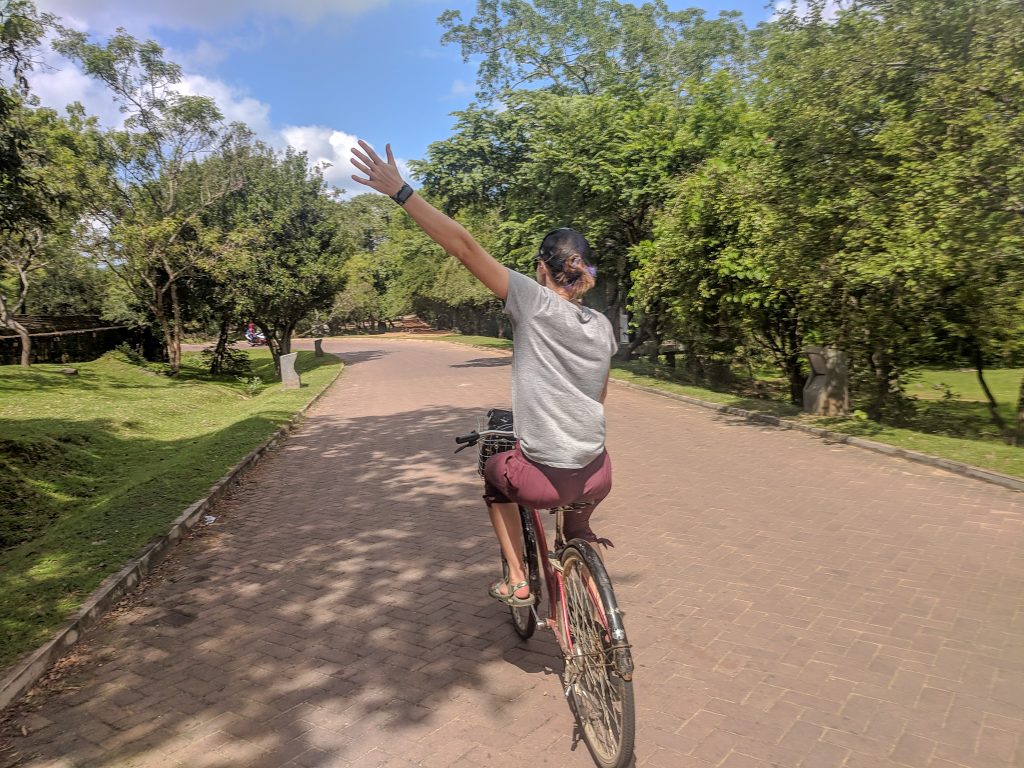
Plan a Trip During the Shoulder Seasons
Traveling either right before or after (think within a month or so) a destination’s busy season helps money from tourism goes a bit further. Plus, you’ll have the added bonus of fewer crowds. Not to mention, prices tend to be slightly cheaper, so you can take that more direct flight.
How to Find Sustainable, Eco-Friendly Accommodations
The hotel industry wastes a disgusting amount each and every year. Try and stay at places that have recycling programs, offer water coolers instead of plastic bottles and have sustainable hotel practices. Don’t leave the AC blasting and all of the lights on. Avoid getting your linens and towels changed each day (I mean, are you really doing that at home?).
Look for accommodation that has programs that support local communities, such as farm-to-table dining, kids English program, or another interesting initiative.
A Note about AirBnB
Understanding the impacts of Airbnb is essential in being an ethical tourist. In more rural places, or areas experiencing a rise in housing prices locals are often squeezed out of the housing market by Airbnb. Many governments are working to combat this, but be sure to look into the local laws for AirBnBs and if you do stay, try to stay in one that is locally owned or in someone’s house (not just a rental property).
Consider Hiring a Local Guide, Even if You Don’t Need One
When I went trekking in Nepal, I could have hiked the entire trail by myself. I didn’t need a porter or guide to lead the way. However, Nepal’s economy depends heavily on tourism and giving not one, but two people a job was the least I could do. The universe smiled on me, and several years later I’m still close with my guide today, we chat all the time.
The point is, hiring a local guide not only helps the local economy, but it also shows respect to that countries traditions and reliance on tourism. Not to mention, you’ll get far more out of your experience with a guide to chat with and you may just make a lifelong friend.
Related: How to Hire a Reliable, Top-Notch Local Trekking Guide in Nepal
How to Find Local, Sustainable Tour Companies
Sustainable, ethical tour companies are an important component of ethical travel. Support sustainable and ethical tourism by booking tours that support those initiatives. Look for tours companies that:
- Pay attention to their waste impact
- Give money or services back to the local community
- Hire and buy locally
- Seek to educate you about local issues and needs
- Have the reviews to back it up
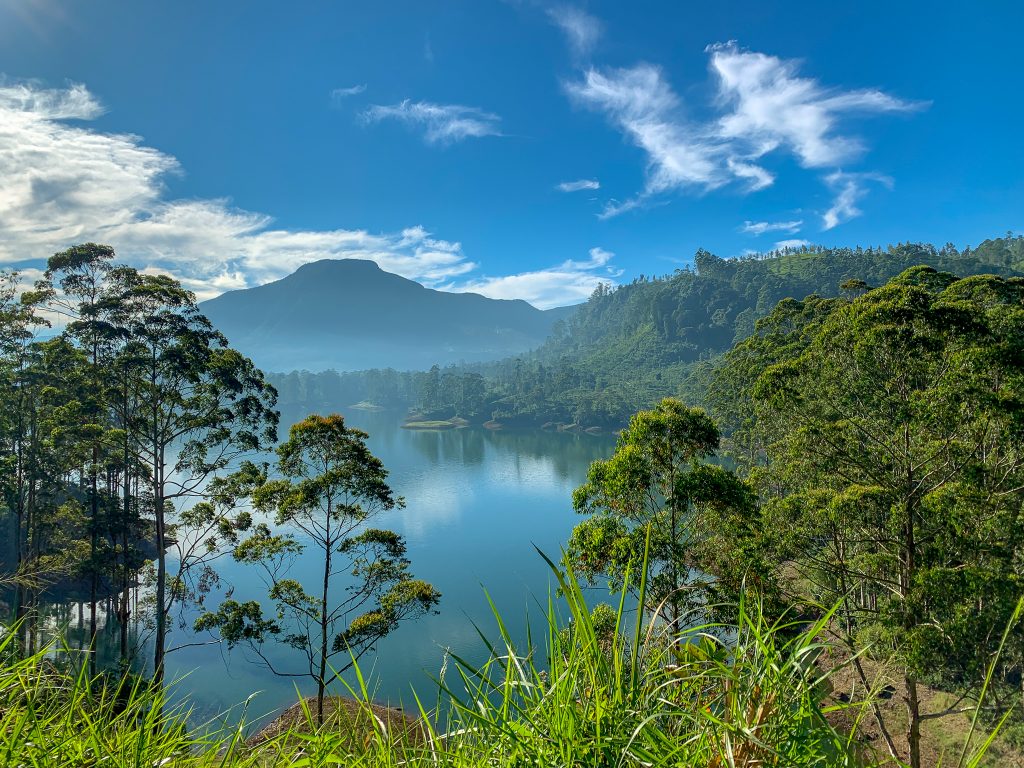
Pack the Essentials: Eco-Friendly Travel Gear to Lessen Your Impact
Every time I go on a trip I pack a few key eco-friendly travel essentials. Here’s a quick look at a few of the best sustainable travel gear pieces and why you should take them.
- The Grayl Geopress: This water filter does it all (filters dirt, grime, bacteria, and viruses) and can easily be used at public water sources while you’re out and about. Bonus points for also being a water bottle.
- The SteriPen: This bad boy has been my standby for years. It’s a little more difficult to use it while you are out and about, but I’ve taken this thing everywhere from Colombia to Kathamandu and never gotten sick. Their customer support is also top-notch. When mine broke in the Himalaya, they sent me a newer model for free – no questions asked.
- Stasher Bags: These totally plastic-free, silicone bags are an ideal choice for keeping freshly-bought fruits and nuts for travel.
- Bite toothpaste: These toothpaste pills take the plastic out of the equation. Say goodbye travel-sized toothpaste tubes. Simply bite down and brush.
- Rawlogy Cork Massage Balls: If you get pain on long-haul flights or transport, whip out this cork massage ball or carry a cork massage roller. The ball weighs next to nothing and the roller is compact. Simply genius.
- Kula Cloth: Ladies, stop carrying around toilet paper for every time you pee. This anti-microbial pee cloth saves tons of TP.
- A reusable grocery bag: Stop. Using. Plastic. This weighs nothing and takes up zero space.
- A metal straw: Stop using plastic and avoid putting your mouth on something suspect.
For more see: The Sustainable Traveler’s List of Essential Items (coming soon)
Ethical, Sustainable, and Responsible Travel Tips: While You’re Away
Once you’ve arrived, there’s still work to do in order to ensure that you’re continuing your travels in an ethical way. These responsible travel tips for your time on the ground are geared towards respecting the place, people, and environment you’re visiting.
Avoid Plastic Like the Plague
Avoiding plastic is actually harder than it sounds. Like way harder than it sounds, especially if you enjoy traveling in the developing world. The easiest and more important way to do this is to stop buying plastic bottled water. Avoiding disposable plastic water bottles is much simpler and cheaper than it sounds. Purchase a water purifier and fill from the tap. Just be sure to purchase a filter that protects against viruses such as GeoPress or SteriPen. Look for a water purifier, not a water filter.
Practice Leave No Trace
While you’re outside, whether it be on a hiking trail or in a city park, be sure to follow one simple rule. Leave it better than you found it. This means not leaving trash behind (and picking up the trash of others). Staying on the paths provided, not feeding or harassing wildlife, and following rules regarding going to the bathroom (stay at least 100 feet or 70 adult steps from water sources).
Keep in mind that things you might not think are trash actually are. Fruit and food byproducts should never be thrown on the ground since they aren’t a part of wild animals’ natural diets.
In many areas, human waste is considered trash and you are required to pack it out (this includes used toilet paper, poop, used tampons and other soiled stuff). Bring a small zip baggie to store your trash until you can properly dispose of it. For gross items, sprinkle some baking soda in there to avoid the smell. If you can’t follow the rules, consider staying at home until you’re ready.
Be Aware of What You Are Buying
It is super tempting to shop your shoes off at cheap tourist markets throughout the world. But buyer beware, often times these goods come from India or China and are not in any way authentic. Not to mention they aren’t sustainable and don’t put that much money back in local’s pockets. Also, many of these companies engage in unfair labor practices and may even utilize slave labor.
Instead, opt to buy less and shop at artisanal markets. Make sure the goods you are buying are actually produced in the country your visiting, keeping in mind many vendors will lie to you.
Stay Away from Commerical Chains
Alright, so I have a confession to make, I really like to visit a McDonalds in different countries. I don’t really eat fast food, so I never order anything, but I like to read the menu because it is just so different than home. That’s totally fine. However, you’re out and about, dine locally. Eat street food in places where it’s safe to do so. Support local mom-and-pop restaurants, guesthouses, hostels, and tour companies. Avoid big international chains, since the money doesn’t stay in local hands.
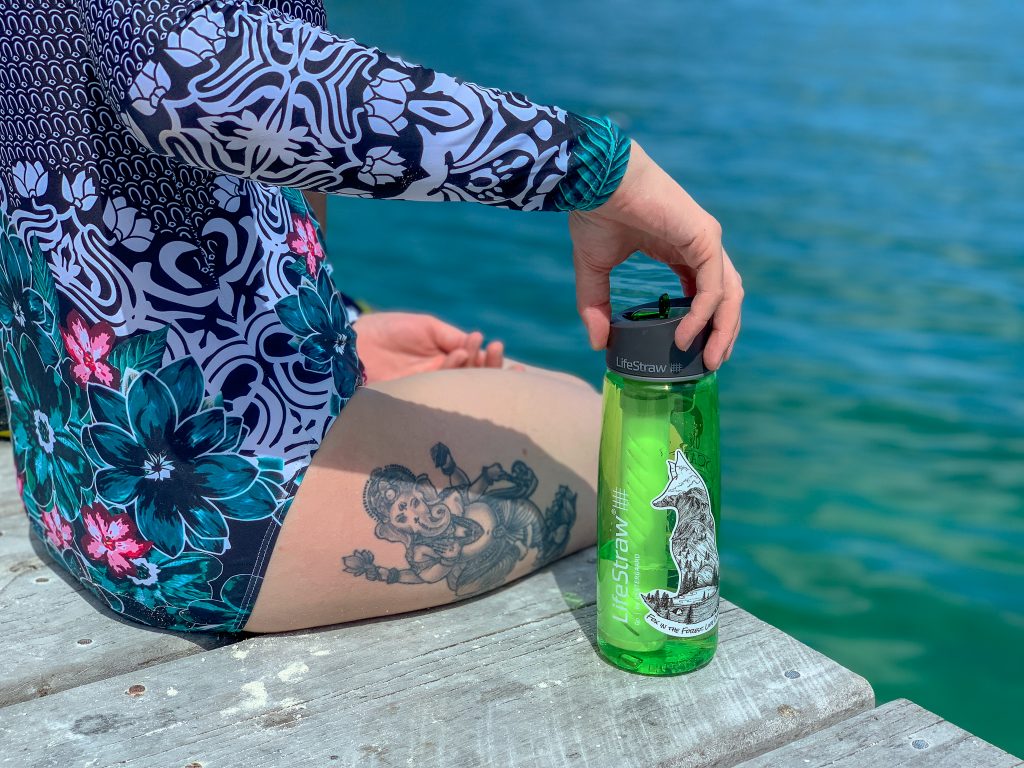
Only Support Ethical Animal Encounters
This is a tough subject, and likely warrants it’s own post altogether. However, if you choose to engage with wildlife, then you should certainly work extra-hard to ensure that you are supporting an ethical company. Never participate in any tour or activity that:
- Chases or baits wild animals
- Encourages you to touch wild animals – always observe from a respectable distance
- Harasses wildlife
- Makes domesticated wildlife do trick, pose for photos, or gives rides (these animals are often drugged or beaten)
- If you’re riding stock animals, make sure that reviews confirm that the animals look healthy.
Cultural Awareness
Don’t be a turd. Before you arrive, brush up on any cultural traditions, taboos, and what is considered polite and rude behavior. Then act that way. It may be totally foreign to you and not make any sense, but that’s why you’re traveling right? Don’t be disrespectful and certainly don’t go blind into a region without understanding its cultural heritage, tradition, and customs.
Learn Local Customs and Language
Before you travel to any place, learn a few key phrases. You don’t have to be fluent, but even knowing how to say hi, bye, please, and thank you can go a long way. Similarly, be sure to brush up on common courtesies, such as how to receive and give money, how to enter a room, and how to dress. Please don’t be that person wearing a thong bikini or a backless dress in a conservative country.
Key phrases to learn include:
- Hello
- Goodbye
- Please
- Thank you
- Yes
- No
- Numbers 1 through 10
Consider Keeping Your Comments to Yourself
If you don’t agree with something, keep it to yourself unless it is endangering your safety. Don’t make comments that something is weird, wrong, or gross, just observe. Also, avoid making generalizations or comparisons to home or other places in public. For example, lots of people call Sri Lanka “India Lite.” Sri Lanka is its own country with its own customs, history, and tradition. It isn’t India and it’s actually rude to call it India.
Related: 31 Things to Know Before You Go to Sri Lanka
Acknowledge Your Privilege
Privilege is a scary word that most people shy away from. I like to tell people that privilege is a spectrum and everyone on this planet lies somewhere on the privilege scale.
Having privilege means that for circumstances out of your control (the color of your skin, your sexual identity, the ability of your body, the country you were born in, the language you speak) makes certain things easier. Having privilege doesn’t mean your life isn’t hard, that you don’t work hard, or you have everything handed to you.
If you have the time, energy, money, and ability to go overseas and travel, you have privilege. Remember that when you’re engaged in responsible travel. Simply reflect on it. Talk about it on your social media posts. You don’t need to shout it from the rooftops, but be aware and keep your eyes open to what is available to you.
Always Ask Before You Snap a Photo
How would you feel if you were going about your day and a stranger came up to you and took your picture on your daily commute? It would creep you out or at least make you pause. People in other countries have similar feelings. Always ask before you snap, especially if you’re taking photos of children.
Keep Your Dollar Local
When you’re spending your money ask, where will this dollar end up? Will it help feed local families? Does it go towards promoting an artisan and their craft? Does it help a small business? If the answer isn’t yes to one of those, consider spending elsewhere.
Learn About the Original Inhabitants
Many places (ahem, the US ahem) have a brutal, untold history of colonization or displacement of native people. Learn about these issues before and during your trip. Make it a point to visit local, indigenous communities and support their efforts. If you are active on social media, give a nod to the original inhabitants of the land you’re traveling in.
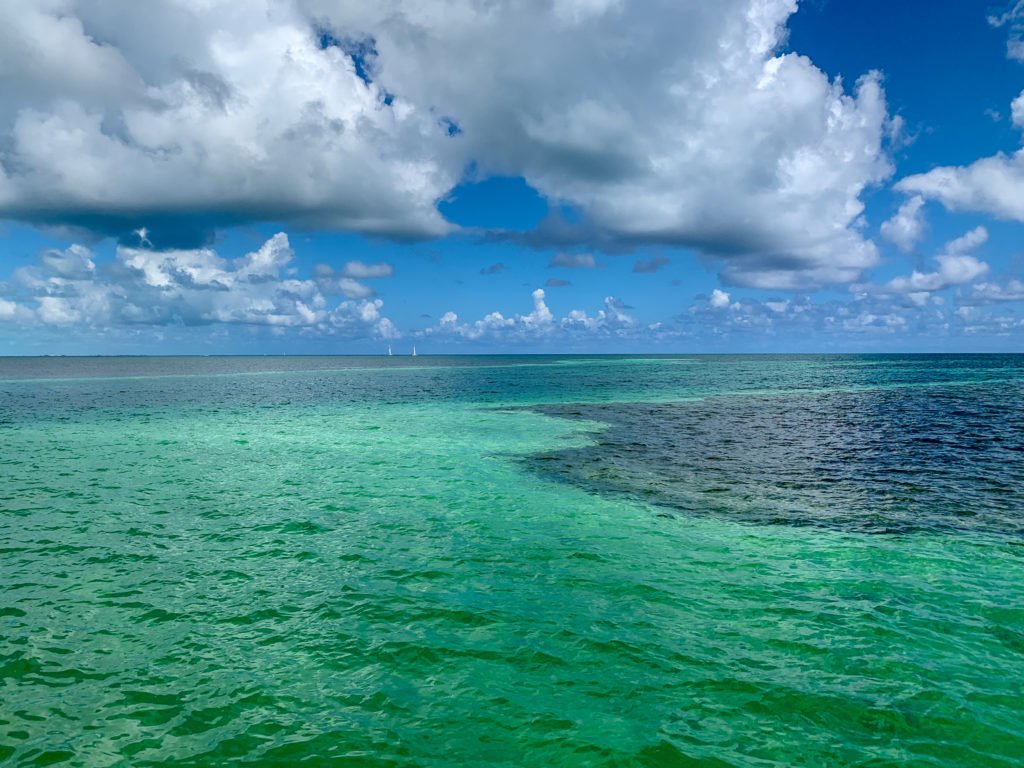
Think Twice Before You Geotag
Yet another controversial topic in the wonderful realm of responsible travel. On the one hand, geotagging, or tagging a specific location on social media, has a tremendous impact on the popularity of a place. This leads to a domino effect where animals and plants can be poached, over-tourism can erupt and cause damage to local communities.
However, not geotagging is seen as gatekeeping or holding “hidden gems” to ourselves. Many people consider this to be a racist act designed to stop those less able from finding a place. I get both sides of the argument, however, if you are traveling in an area that is fragile, contains wild animals or exotic plants that are endangered, refrain from tagging a specific place. The country is okay but think twice before you put your location up there.
A Final Note About How to Travel Responsibly
You were just bombarded by several thousand words worth of information. Keep in mind that a path towards more sustainable travel is a journey. Being eco-conscious and socially-minded when you travel takes time and practice. No one expects you to get it right 100 percent of the time. The point is that you try. Take things step by step.
One of the most important things to remember about ethical tourism is that it isn’t always black and white. It’s important to weigh your decisions and choose the most ethical solution. Either way, now you’re empowered to get out there and make more responsible choices when you travel.
